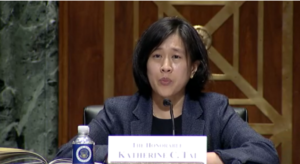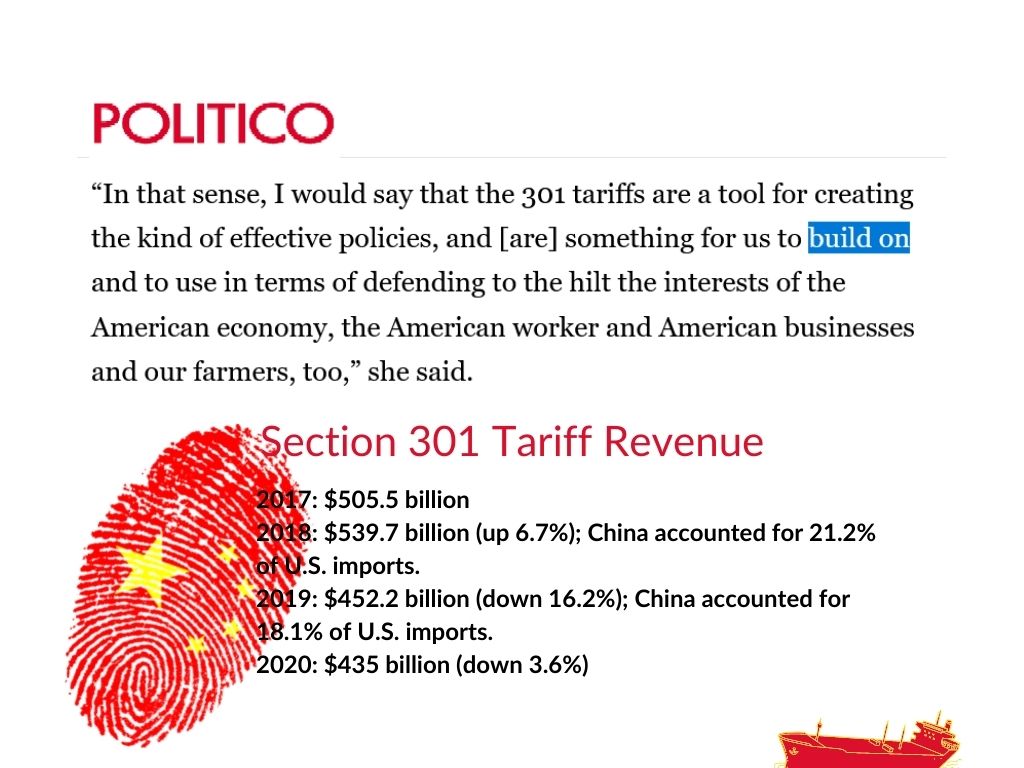USTR Katherine Tai says the Biden administration is fine with China tariffs. The world has not fallen apart because of them. CPA members should not doubt that the patience of many multinational corporations and their K Street advocates is wearing thin on this issue. Recent supply chain disruptions, all of them stemming from China, will be used as a battering ram against existing China trade policies.
To date, companies of all sizes have been seeking waivers to the Trump-era tariffs, especially the Section 301 tariffs. They have not yet found a friend in the Biden government. To them, the USTR is at least partially to blame. They want Tai and her team to move faster and poke holes in those tariffs.
Much to their chagrin, Tai told Politico on Thursday that the Trump-era trade tariffs were effective.
“I would say that the 301 tariffs are a tool for creating the kind of effective policies, and are something for us to build on and to use in terms of defending to the hilt the interests of the American economy, the American worker, and American businesses and our farmers, too,” she said.
She said that those tariffs were “something for us to build on and to use in terms of defending to the hilt the interests of the American economy.”
CPA believes that the 301 tariff program helped prevent us from enriching and rewarding China for its IP theft. “It raised $105 billion in revenue. We have substantially reduced imports from China since 2017 and many companies have moved to the U.S. and other countries,” said Michael Stumo, CEO of CPA. “It is obvious China is not changing its IP theft and other bad behavior. They have not complied with the Phase One agreement. We must strengthen the 301 program significantly.”
Tai also challenged the notion that those tariffs are paid by American consumers. She said it was a more complicated calculation than many suggest, Politico noted.

Katherine Tai, USTR.
“The interests of our economy and the way our stakeholders are arrayed in our economy is very complex, and you have to bring an appreciation for that complexity to something as important as navigating the U.S.-China trade and economic relationship,” she said.
Recent supply chain disruptions largely serve China’s interest. That this is happening at a time when the Phase One trade deal is about to expire should not be lost on anyone. While Politico did not quite connect the dots on these issues, the article noted that the trade deal signed by former President Trump expires at the end of the year. So far, data show that China is falling short on its commitment to purchase an additional $200 billion in U.S. goods, though this could be due to the economic slowdown caused by the pandemic. China will clearly use that as an easily sellable excuse.
The Biden administration has to decide whether to negotiate a follow-on agreement.
Tai did not comment on whether she had any plans to meet with her Chinese counterpart, Vice Premier Liu He, a popular fixture in Washington when Robert Lighthizer was at the USTR.
Tai was supposed to meet with the Vice Premier every six months as part of the Phase One agreement, but nothing has been scheduled since. This can’t be chalked up as a Covid excuse, though. John Kerry, Biden’s climate policy envoy, was sent to China last month.
The Biden administration continues to resist pressure from American companies to lift tariffs on billions of dollars of Chinese goods. The previous government imposed those duties and then subsequently excluded certain goods, but those exclusions expired at the end of last year and Biden has not moved to renew those exclusions.
The Section 301 tariffs got “a lot of people’s attention,” Tai told Politico. That includes U.S. companies, their workers, trading partners and, obviously, China, she said.












